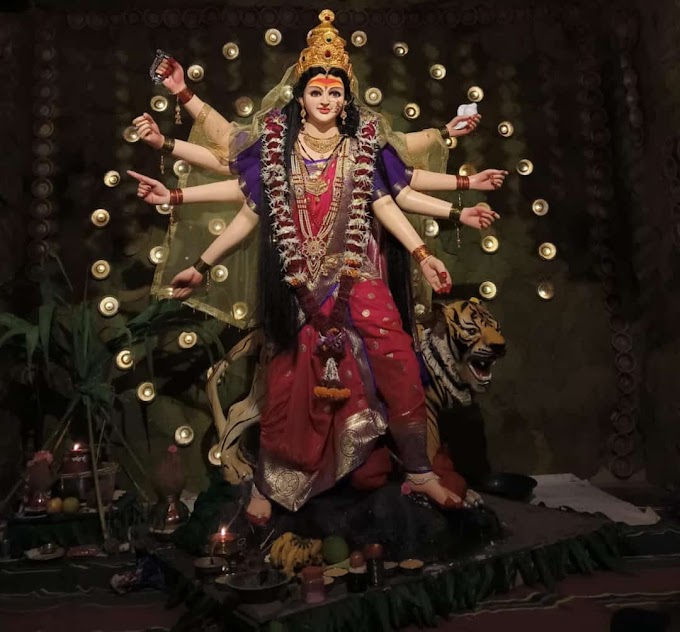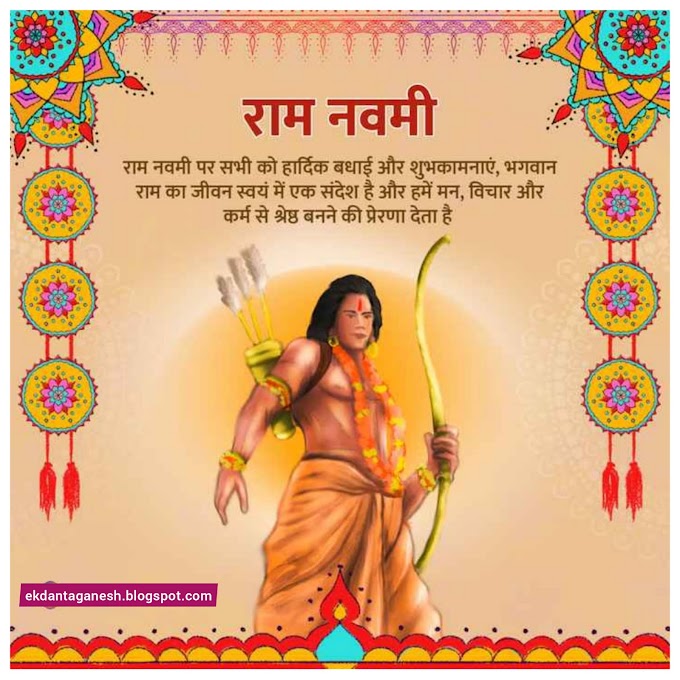Shrimad Bhagavad Gita
Chapter 01 | Arjun Vishad Yog
धृतराष्ट्र उवाच |
धर्मक्षेत्रे कुरुक्षेत्रे समवेता युयुत्सवः |
मामकाः पाण्डवाश्चैव किमकुर्वत सञ्जय ||1||
सञ्जय उवाच ।
दृष्ट्वा तु पाण्डवानीकं व्यूढं दुर्योधनस्तदा ।
आचार्यमुपसङ्गम्य राजा वचनमब्रवीत् ।। 2।।
पश्यैतां पाण्डुपुत्राणामाचार्य महतीं चमूम् ।
व्यूढां द्रुपदपुत्रेण तव शिष्येण धीमता ।। 3।।
अत्र शूरा महेष्वासा भीमार्जुनसमा युधि
युयुधानो विराटश्च द्रुपदश्च महारथ: || 4||
धृष्टकेतुश्चेकितान: काशिराजश्च वीर्यवान् |
पुरुजित्कुन्तिभोजश्च शैब्यश्च नरपुङ्गव: || 5||
युधामन्युश्च विक्रान्त उत्तमौजाश्च वीर्यवान् |
सौभद्रो द्रौपदेयाश्च सर्व एव महारथा: || 6||
अस्माकं तु विशिष्टा ये तान्निबोध द्विजोत्तम |
नायका मम सैन्यस्य संज्ञार्थं तान्ब्रवीमि ते || 7||
भवान्भीष्मश्च कर्णश्च कृपश्च समितिञ्जय: |
अश्वत्थामा विकर्णश्च सौमदत्तिस्तथैव च || 8||
अन्ये च बहव: शूरा मदर्थे त्यक्तजीविता: |
नानाशस्त्रप्रहरणा: सर्वे युद्धविशारदा: || 9||
अपर्याप्तं तदस्माकं बलं भीष्माभिरक्षितम् |
पर्याप्तं त्विदमेतेषां बलं भीमाभिरक्षितम् || 10||
अयनेषु च सर्वेषु यथाभागमवस्थिता: |
भीष्ममेवाभिरक्षन्तु भवन्त: सर्व एव हि || 11||
तस्य सञ्जनयन्हर्षं कुरुवृद्ध: पितामह: |
सिंहनादं विनद्योच्चै: शङ्खं दध्मौ प्रतापवान् || 12||
तत: शङ्खाश्च भेर्यश्च पणवानकगोमुखा: |
सहसैवाभ्यहन्यन्त स शब्दस्तुमुलोऽभवत् || 13||
तत: श्वेतैर्हयैर्युक्ते महति स्यन्दने स्थितौ |
माधव: पाण्डवश्चैव दिव्यौ शङ्खौ प्रदध्मतु: || 14||
पाञ्चजन्यं हृषीकेशो देवदत्तं धनञ्जय: |
पौण्ड्रं दध्मौ महाशङ्खं भीमकर्मा वृकोदर: || 15||
अनन्तविजयं राजा कुन्तीपुत्रो युधिष्ठिर: |
नकुल: सहदेवश्च सुघोषमणिपुष्पकौ || 16||
काश्यश्च परमेष्वास: शिखण्डी च महारथ: |
धृष्टद्युम्नो विराटश्च सात्यकिश्चापराजित: || 17||
द्रुपदो द्रौपदेयाश्च सर्वश: पृथिवीपते |
सौभद्रश्च महाबाहु: शङ्खान्दध्मु: पृथक् पृथक् || 18||
स घोषो धार्तराष्ट्राणां हृदयानि व्यदारयत् |
नभश्च पृथिवीं चैव तुमुलोऽभ्यनुनादयन् || 19||
अथ व्यवस्थितान्दृष्ट्वा धार्तराष्ट्रान् कपिध्वज: |
प्रवृत्ते शस्त्रसम्पाते धनुरुद्यम्य पाण्डव: ||20||
हृषीकेशं तदा वाक्यमिदमाह महीपते |
अर्जुन उवाच |
सेनयोरुभयोर्मध्ये रथं स्थापय मेऽच्युत || 21||
यावदेतान्निरीक्षेऽहं योद्धुकामानवस्थितान् |
कैर्मया सह योद्धव्यमस्मिन् रणसमुद्यमे || 22||
योत्स्यमानानवेक्षेऽहं य एतेऽत्र समागता: |
धार्तराष्ट्रस्य दुर्बुद्धेर्युद्धे प्रियचिकीर्षव: || 23||
सञ्जय उवाच |
एवमुक्तो हृषीकेशो गुडाकेशेन भारत |
सेनयोरुभयोर्मध्ये स्थापयित्वा रथोत्तमम् || 24||
भीष्मद्रोणप्रमुखत: सर्वेषां च महीक्षिताम् |
उवाच पार्थ पश्यैतान्समवेतान्कुरूनिति || 25||
तत्रापश्यत्स्थितान् पार्थ: पितृ नथ पितामहान् |
आचार्यान्मातुलान्भ्रातृ न्पुत्रान्पौत्रान्सखींस्तथा || 26||
श्वशुरान्सुहृदश्चैव सेनयोरुभयोरपि |
तान्समीक्ष्य स कौन्तेय: सर्वान्बन्धूनवस्थितान् || 27||
कृपया परयाविष्टो विषीदन्निदमब्रवीत् |
अर्जुन उवाच |
दृष्ट्वेमं स्वजनं कृष्ण युयुत्सुं समुपस्थितम् || 28||
सीदन्ति मम गात्राणि मुखं च परिशुष्यति |
वेपथुश्च शरीरे मे रोमहर्षश्च जायते || 29||
गाण्डीवं स्रंसते हस्तात्त्वक्चै व परिदह्यते |
न च शक्नोम्यवस्थातुं भ्रमतीव च मे मन: || 30||
निमित्तानि च पश्यामि विपरीतानि केशव |
न च श्रेयोऽनुपश्यामि हत्वा स्वजनमाहवे || 31||
न काङ्क्षे विजयं कृष्ण न च राज्यं सुखानि च |
किं नो राज्येन गोविन्द किं भोगैर्जीवितेन वा || 32||
येषामर्थे काङ्क्षितं नो राज्यं भोगा: सुखानि च |
त इमेऽवस्थिता युद्धे प्राणांस्त्यक्त्वा धनानि च || 33||
आचार्या: पितर: पुत्रास्तथैव च पितामहा: |
मातुला: श्वशुरा: पौत्रा: श्याला: सम्बन्धिनस्तथा || 34||
एतान्न हन्तुमिच्छामि घ्नतोऽपि मधुसूदन |
अपि त्रैलोक्यराज्यस्य हेतो: किं नु महीकृते || 35||
निहत्य धार्तराष्ट्रान्न: का प्रीति: स्याज्जनार्दन |
पापमेवाश्रयेदस्मान्हत्वैतानाततायिन: || 36 ||
तस्मान्नार्हा वयं हन्तुं धार्तराष्ट्रान्स्वबान्धवान् |
स्वजनं हि कथं हत्वा सुखिन: स्याम माधव || 37||
यद्यप्येते न पश्यन्ति लोभोपहतचेतस: |
कुलक्षयकृतं दोषं मित्रद्रोहे च पातकम् || 38||
कथं न ज्ञेयमस्माभि: पापादस्मान्निवर्तितुम् |
कुलक्षयकृतं दोषं प्रपश्यद्भिर्जनार्दन || 39||
कुलक्षये प्रणश्यन्ति कुलधर्मा: सनातना: |
धर्मे नष्टे कुलं कृत्स्नमधर्मोऽभिभवत्युत || 40||
अधर्माभिभवात्कृष्ण प्रदुष्यन्ति कुलस्त्रिय: |
स्त्रीषु दुष्टासु वार्ष्णेय जायते वर्णसङ्कर: || 41||
सङ्करो नरकायैव कुलघ्नानां कुलस्य च |
पतन्ति पितरो ह्येषां लुप्तपिण्डोदकक्रिया: || 42||
दोषैरेतै: कुलघ्नानां वर्णसङ्करकारकै: |
उत्साद्यन्ते जातिधर्मा: कुलधर्माश्च शाश्वता: || 43||
उत्सन्नकुलधर्माणां मनुष्याणां जनार्दन |
नरकेऽनियतं वासो भवतीत्यनुशुश्रुम || 44||
अहो बत महत्पापं कर्तुं व्यवसिता वयम् |
यद्राज्यसुखलोभेन हन्तुं स्वजनमुद्यता: || 45||
यदि मामप्रतीकारमशस्त्रं शस्त्रपाणय: |
धार्तराष्ट्रा रणे हन्युस्तन्मे क्षेमतरं भवेत् || 46||
सञ्जय उवाच |
एवमुक्त्वार्जुन: सङ्ख्ये रथोपस्थ उपाविशत् |
विसृज्य सशरं चापं शोकसंविग्नमानस: || 47||
Asked Dhritarashtra,
In the field of righteousness called Kurukshetra, O Sanjaya, doing what are my sons and Pandavas, assembled and excited to fight?
Sanjaya said:
"Having seen the Pandava army arranged in a military formation, King Duryodhana then approached his teacher, Dronacharya, and spoke the following words:
"O teacher, behold this mighty army of the sons of Pandu, arranged in a military formation by your intelligent disciple, the son of Drupada.
Here are heroes, mighty archers equal in battle to Bhima and Arjuna: Yuyudhana, Virata, and Drupada, the mighty chariot warrior.
There are also Dhrishtaketu, Chekitana, the valiant Kashiraja, Purujit, Kuntibhoja, and Shaibya—all great warriors.
Yudhamanyu, the brave Uttamauja, the son of Subhadra, and the sons of Draupadi—all are mighty chariot warriors.
But know, O best of the twice-born, those who are especially distinguished in our army. I shall name them for your information.
There are Bhishma, Karna, Kripa, Ashwatthama, Vikarna, and the son of Somadatta, who is called Bhurishrava.
There are also many other heroes who have risked their lives for my sake. They are all skilled in warfare and armed with various weapons.
Our army, protected by Bhishma, is insufficient, while their army, protected by Bhima, is sufficient.
Therefore, stationed in your respective positions in the military formation, all of you should protect Bhishma alone."
Then, in order to inspire the joy of Duryodhana, the grandsire of the Kuru dynasty, Bhishma, blew his conch shell, producing a lion-like roar, and also King Yudhishthira, the son of Kunti, blew his conch shell, Anantavijaya.
That great archer, the King of Kashi, the mighty warrior Shikhandi, Dhrishtadyumna, Virata, and the unconquerable Satyaki—all blew their respective conch shells.
The blowing of their conch shells became a tumultuous sound, and it echoed throughout the sky and the earth.
At that time, Arjuna, the son of Pandu, seated in his chariot bearing the flag marked with Hanuman, took up his bow and prepared to engage in battle.
Arjuna, in the midst of both armies, spoke the following words to Krishna, who was his charioteer:
"O Krishna, please position my chariot between both armies so that I may see those who have assembled here to fight, wishing to please me, and know with whom I must fight in this great encounter.
Let me see those who are eager to serve the evil-minded son of Dhritarashtra, and who have come here to fight in the battle for his sake."
Sanjaya said:
"Having thus been addressed by Arjuna, Lord Krishna, displaying His majestic form, positioned the excellent chariot in the midst of the two armies.
In front of Bhishma, Drona, and all the rulers of the world, He said, 'O Arjuna, behold all the Kurus gathered here.'"
Arjuna saw there his fathers, grandfathers, teachers, maternal uncles, brothers, sons, grandsons, and friends as well.
When Arjuna saw all these relatives and friends gathered in opposition, he was overwhelmed with compassion and sadness, and thus, with a despondent heart, he spoke the following words.
Arjuna said:
"O Krishna, seeing my own kinsmen standing here and eager to fight, my limbs give way, and my mouth becomes dry. My body trembles, and my hair stands on end.
Gandiva, my bow, slips from my hand, and my skin burns intensely. I am unable to stand any longer, and my mind seems to be whirling.
I see adverse omens, O Kesava, and I do not foresee any good by killing my own kinsmen in battle.
I desire neither victory nor a kingdom nor pleasures. Of what avail is a kingdom to us, O Govinda? Of what avail are pleasures or even life?
Those for whose sake we desire a kingdom, enjoyment, and happiness are standing here in battle, having renounced their lives and wealth.
Teachers, fathers, sons, and grandfathers, as well as maternal uncles, fathers-in-law, grandsons, brothers-in-law, and other relatives—I do not wish to kill them, even if they kill me, O Madhusudana.
O Krishna, what happiness will we derive from killing these sons of Dhritarashtra? Only sin will accrue by killing these felons.
Therefore, it is not proper for us to kill the sons of Dhritarashtra, our own kinsmen. For how can we be happy by killing our own relatives, O Janardana?
Although they are overtaken by greed and see no evil in the destruction of families and no sin in hostility toward friends, why should we, O Krishna, who clearly see the evil in the destruction of a family, engage in these acts of sin?
When a family declines, O Krishna, the traditional duties of that family are destroyed. When duty is destroyed, O Krishna, the entire family is then led into irreligion.
By the misdeeds of those who destroy the family tradition and thus give rise to unwanted progeny, all kinds of community projects and family welfare activities are devastated.
When irreligion is prominent in the family, O Krishna, the women of the family become corrupt, and from the degradation of womanhood, O descendant of Vrishni, comes unwanted progeny.
An increase of unwanted population certainly causes hellish life both for the family and for those who destroy the family tradition. The ancestors of such corrupt families fall down, because the performances for offering them food and water are entirely stopped.
By the evil deeds of those who destroy the family tradition and thus give rise to unwanted children, all kinds of community projects and family welfare activities are devastated.
O Krishna, we have heard that there are severe punishments for those who destroy family traditions.
Alas, how strange it is that we are preparing to commit a great sin by being eager to kill our own kinsmen out of greed for the pleasures of a kingdom.
If the sons of Dhritarashtra, weapons in hand, were to kill me in battle, unresisting and unarmed, that would be more agreeable to me."











